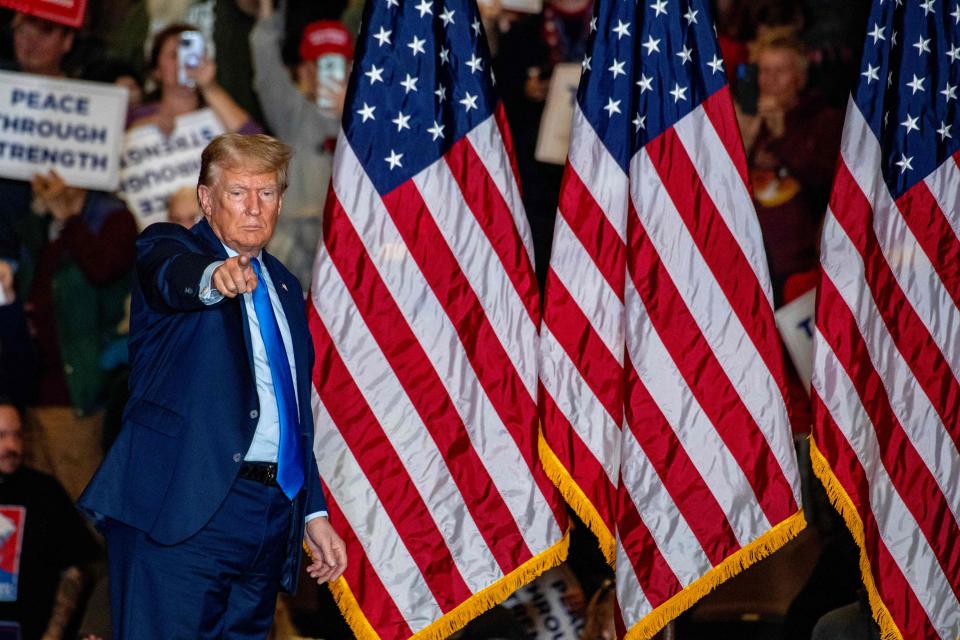Colorado court rules Trump can stay on primary ballot, but says he 'engaged in an insurrection.'
WASHINGTON ? A Colorado judge on Friday ruled that former President Donald Trump will appear on that state's presidential primary ballot next year, waving off the latest argument raised by liberal groups that he had disqualified himself for a second term by attempting to overturn the 2020 election.
Colorado District Judge Sarah Wallace wrote that the provision in the 14th Amendment that could disqualify certain officials involved with insurrection did not apply to a president. Wallace also found that Trump "engaged in an insurrection" by inciting the mob that stormed that U.S. Capitol on Jan. 6, 2021.
Courts in three other states ? Minnesota, Michigan and New Hampshire ? have shot down similar legal claims in recent weeks.
The Colorado lawsuit, filed by the watchdog group Citizens for Responsibility and Ethics in Washington, is one of dozens pending across the nation that rely on a post-Civil War-era clause of the 14th Amendment to bar anyone who "engaged in insurrection" after taking an oath to uphold the Constitution from holding higher office again.
Honked: She got a ticket for beeping her car horn. Now she's asking the Supreme Court to sound off.
Wallace wrote that she agreed with arguments that the drafters of the provision "did not intend to include the president" as being covered. Wallace found that the attack on the Capitol "easily satisfied the definition of insurrection.
CREW focused on the finding that insurrection occurred. The group also vowed to appeal.
"The court's decision affirms what our clients alleged in this lawsuit: that Donald Trump engaged in insurrection based on his role in January 6th," CREW president Noah Bookbinder said. "We are proud to have brought this historic case and know we are right on the facts and right on the law."
Steven Cheung, a Trump campaign spokesperson, said the ruling was "another nail in the coffin of the un-American ballot challenges.
The plaintiffs argued that Trump's efforts to overturn his 2020 election loss, leading to the Jan. 6, 2021, attack on the U.S. Capitol, mean he's disqualified from the presidency in the same way he wouldn't qualify if he was not a natural-born citizen, another constitutional prerequisite for the office.
The section of the 14th Amendment at issue in the cases, Section 3, says that no one can hold federal office who "having previously taken an oath, as a member of Congress, or as an officer of the United States...shall have engaged in insurrection or rebellion against the same, or given aid or comfort to the enemies thereof."
The clause at issue has only been used a handful of times since immediately after the Civil War. Trump's lawyers had argued it was never meant to apply to the office of president, which is not mentioned in the text. They also framed the legal effort as an attempt to take away from voters the right to choose a president.
Minnesota's highest court ruled Nov. 8 that Trump should be allowed to appear on the state's presidential primary ballot, though courts there may revisit the issue for the general election.

The Minnesota court, in a four-page order, said the state's primary election was an "internal party election" and that winning that contest doesn't necessarily place the nominee on the state's general election ballot. There is no state law that bars a political party from nominating a candidate who may be ineligible to hold office, the court wrote.
A judge in Michigan, meanwhile, ruled that Trump would appear on the ballot and wrote that questions about how to define an "insurrection" would be be better left to Congress than to courts.
"It takes the decision of whether there was a rebellion or insurrection and whether or not someone participated in it from the Congress, a body made up of elected representatives of the people of every state in the nation, and gives it to but one single judicial officer, a person who no matter how well intentioned, evenhanded, fair and learned, cannot in any manner or form possibly embody the represented qualities of every citizen of the nation-as does the House of Representatives and the Senate," Michigan Judge James Robert Redford wrote.
Contributing: David Jackson
This article originally appeared on USA TODAY: Colorado latest to side with Trump over effort to keep him off ballots
